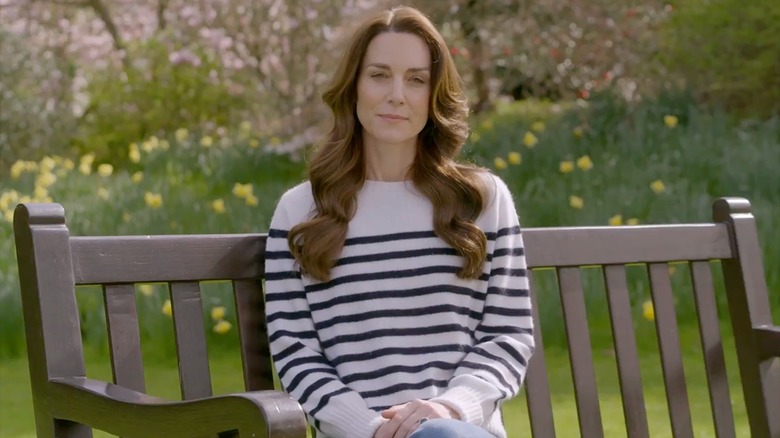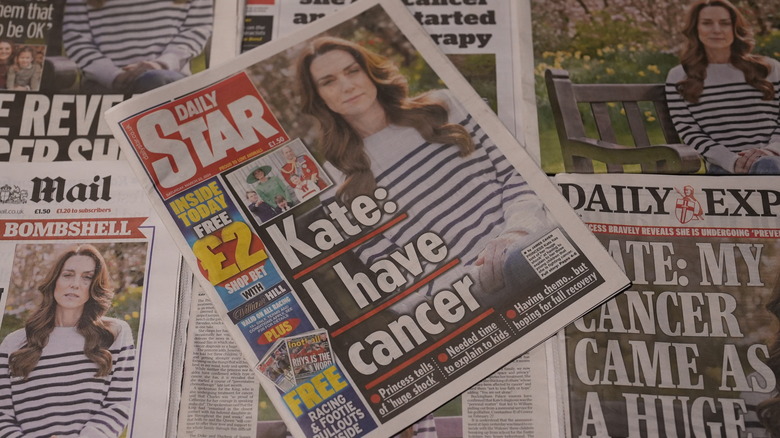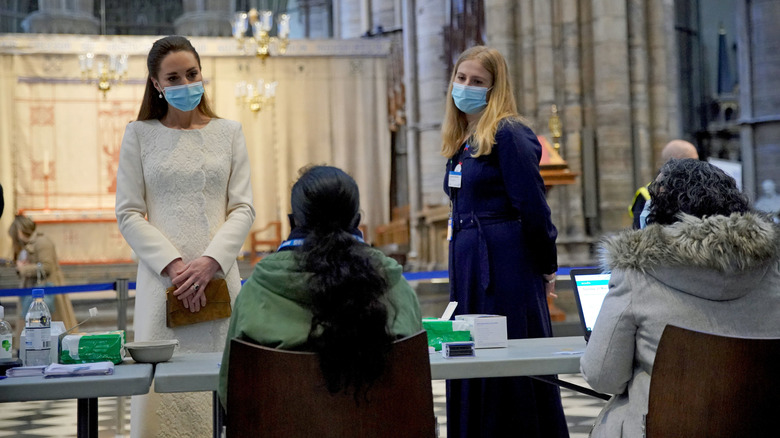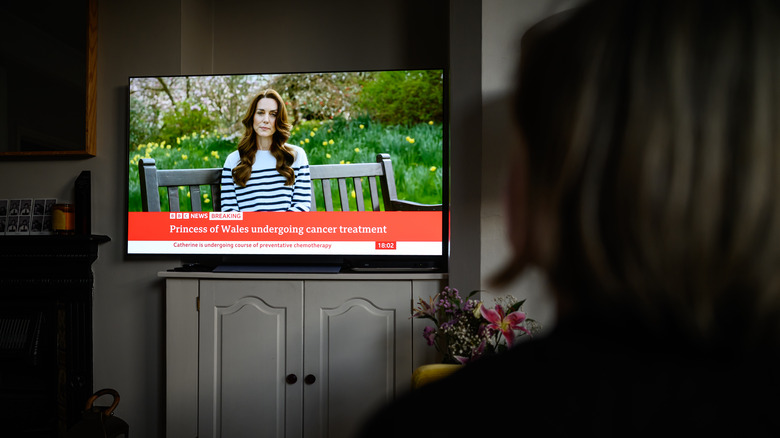All The Conspiracy Theories Kate Middleton's Cancer Announcement Video Has Generated
Mother's Day 2024 is one the world won't soon forget. Royal pundits were excited when Princess Catherine shared a family portrait to celebrate the day in the U.K., but that excitement soon turned into suspicion when prominent news agencies pulled the photo after discovering significant alterations. This was the future queen's first "appearance" after undergoing unspecified abdominal surgery in January. Before long, Catherine confessed to editing the suspicious Mother's Day portrait, leaving the public with even more questions than answers. Conspiracy theorists had a field day, and even some celebrities weighed in with opinions of their own.
This was a media tempest unlike any the palace has endured in recent memory, and as questions about Catherine's whereabouts were posed by the public and the media alike, pressure on Kensington Palace to release a statement kept mounting. Finally, after weeks of speculation, the Prince and Princess of Wales' social media accounts shared a video of Catherine making a shocking announcement: She was diagnosed with cancer and has been undergoing treatment. This left many ashamed of their actions and opinions, and thousands of apologies and well-wishes started pouring in from across the world. But the damage to the palace's reputation may well be irreparable.
Releasing an altered photo to the public left some suspicious, so when Catherine's video dropped, some started looking for signs that it had been altered too. More conspiracy theories started pouring in, leaving many questioning the clip's authenticity, with some hypotheses more bizarre than others.
Some speculate that Catherine's cancer announcement video is an AI deepfake
According to one of Princess Catherine's friends, the motivation behind the cancer announcement was a deep sense of duty. "She felt she had to do it because of who she is," the friend told The Sunday Times. "It was more that she knows she is a public figure and has a wider leadership responsibility." However, conspiracy theorists appeared to have no empathy for the princess and attempted to poke holes in the video. One of the most prominent conspiracy theories that emerged claimed the video was not real but an AI deepfake.
Skeptics took to X, formerly known as Twitter, to point out possible signs of artificial intelligence in the video. One user questioned the unmoving vegetation in the background, while others pointed out that Catherine's usual dimple appeared to be missing. Soon, an old video of Catherine attending a "Heads Together" charity event resurfaced. "This video, dating back seven years, features Kate Middleton wearing the same sweater, with her hairstyle bearing a striking resemblance to her recent video where she discloses her battle with cancer," one user wrote. Some speculated, as the netizen pointed out, that "a deepfake or AI may have been crafted based on this footage of Kate from 2017."
However, France 24's "Truth or Fake" segment quickly put these conspiracies to rest, pointing out that both the material and sleeves of the sweater in Catherine's announcement video are not the same as that of the sweater in the charity video. Additionally, Hany Farid, a professor at the University of California, Berkeley, who specializes in the detection of deepfakes, told The Washington Post that the video shows "absolutely zero evidence" of AI. Furthermore, Kensington Palace told the outlet that the rumors of AI in the video are "factually inaccurate."
The (not so) curious case of the disappearing ring
Some royal fans think that Princess Catherine's engagement ring is cursed, and now that a conspiracy theory about that very ring has gained immense popularity, Catherine may even be wondering that herself. After Kensington Palace shared the princess' cancer announcement video, fans analyzed it in detail. Some noticed that when the video is slowed down significantly, the ring appears to be on Catherine's finger one moment and gone the next. This, of course, sparked more rumors that the video was AI-generated.
"This Kate Middleton fiasco is insane, she's definitely f***ing dead, her ring f***ing DISAPPEARS this video is literally deepfaked," one person tweeted alongside a slowed-down clip of the video, which has since been viewed close to 6 million times. However, digital AI artist Garry Walker jumped into the melee to point out that people were vastly overestimating AI's current abilities
"Generative AI tech simply isn't good enough yet to create convincing audio and video of a speech at the moment," he shared on X. In another tweet, he addressed the missing ring. "Take into account the fact that the angle you are viewing the ring at changes and the effects of motion blur are present as she moves her hands — the ring is still clearly there," Walker explained. He continued, saying, "The conspiracy theorists are wrong about this one."
Doctors weighed in on Princess Catherine's explanation of her cancer
With rumors about Princess Catherine's health crisis continuing to swirl, the last thing the monarchy needed was a skeptical doctor, but that's exactly what they got after Catherine announced her cancer diagnosis. Dr. Sanjay Gupta and CNN medical analyst Dr. Jonathan Reiner weighed in on Catherine's shocking announcement.
When speaking to CNN, Gupta chose his words carefully, saying that it was very difficult to speculate about the Princess of Wales' condition since no one knows what kind of cancer she has or how advanced it is. He did, however, point out that "preventative chemotherapy," which Catherine said she was receiving, is a "very non-medical term." He continued, saying, "I mean, you don't give chemotherapy preventatively. She has cancer. We don't know what kind of cancer it is, and this is typically something that's referred to as adjuvant chemotherapy, meaning something alongside the surgery now that's being given."
Reiner was more skeptical, telling CNN, "With all respect to the, you know, to the royal family, that kind of, you know, press release doesn't make a lot of medical sense." He explained that patients rarely undergo the extensive sort of surgery Catherine is said to have had in January without doctors knowing that cancer is present ahead of time. Reiner said that patients typically need to undergo various imaging tests beforehand, which would tip doctors off that cancer is the culprit.
Some falsely speculate that Catherine's cancer was triggered by the COVID-19 vaccine
Once Princess Catherine's cancer diagnosis became public, many were shocked that she'd been diagnosed at the young age of 42. This led some conspiracy theorists to point to the COVID-19 vaccine as the cause of her cancer. The vaccine itself has been the subject of countless conspiracy theories, including its connection to what conspiracy theorists refer to as "turbo cancer."
This fictional condition has been debunked multiple times; nevertheless, the conspiracy theory persists, and unfortunately for Catherine, she's been made the unwitting spokesperson. "Kate Middleton yet another victim of the mRNA turbo cancer injections?" one person tweeted. "King Charles, Princess Kate and Sarah the Duchess of York all have cancer. Pfizer has mentioned a new 'Cancer Vaccine'. This is getting ridiculous," another posted. According to experts, though, this is not even possible.
"There is zero basis for any of the things being claimed [about turbo cancer]. [It is] completely made up and none of it is true," Dr. Gigi Gronvall, immunology expert at the Johns Hopkins Center for Health Security, told Reuters. Additionally, the International Agency for Research on Cancer told the AFP (via Yahoo), "Increasing trends in cancer in young persons were already observable before the Covid epidemic and associated vaccination campaigns."
Getty Images inadvertently added fuel to the fire
Editors note on Princess of Wales video from #getty@GettyImages #princessofwales #KateMiddleton #republic pic.twitter.com/gqoLcfXCNO
— Mrs Kensington (@Londonlife44) March 31, 2024
One can't exactly blame photo agencies like Getty for going over images and videos released by the royal family with a fine-toothed comb after the Mother's Day picture debacle, but the photo agency did add some unintended fuel to the ever-raging conspiracy theory fire when it added an editor's note to Princess Catherine's cancer announcement video. "This handout clip was provided by a third-party organization and may not adhere to Getty Images' editorial policy," the note reads.
Some saw this as an indication that Getty suspects that the video was altered. "Getty is a reputable agency trusted by millions. They are not about to destroy their reputation for anyone. They more than likely released this statement because they know it's inauthentic and it's only a matter of time before the cats officially out of the bag," one person tweeted . Another wrote, "This was Getty Images long winded way of saying the video was fake."
However, the photo agency's warning on Catherine's cancer announcement video isn't what some people think. Photographer Patrick Witty explained that this is common practice when the agency receives images from third parties. "Getty does this when they distribute footage they didn't create themselves, it doesn't mean it's fake or AI generated," he tweeted, pointing out other photos with the same note. Getty later provided clarification to E! News, saying, it "includes a standard editors note to handout content provided by third-party organizations."
Experts fear a disinformation campaign fueled the conspiracy theories
If you're left wondering how the conspiracy theories surrounding Princess Catherine got out of control so quickly after the Mother's Day picture fiasco, you're not alone. While social media is powerful, the hysteria surrounding Catherine's whereabouts and health was unprecedented, and there could be more behind those conspiracy theories than just everyday people with too much time on their hands.
A government source told The Telegraph that they suspected the country's rivals, including Russia, Iran, and China, were involved in blowing up the conspiracy theories about Catherine's health. Speaking to NBC News, Martin Innes, the director of the Security, Crime and Intelligence Innovation Institute at Cardiff University in Wales, said he and his associates suspect the Russian disinformation operation, Doppelgänger, to be the main culprit. Innes and his team identified several X accounts that appeared to be associated with Doppelgänger. These accounts all had very specific usernames, used certain wording in their posts, and were created on the same date. The dead giveaway was that all of them were fueling the misinformation campaign surrounding Catherine's health while also pushing pro-Russian content.
Innes explained that the ultimate goal of these operations is to undermine public trust. "It's about destabilization. It's about undermining trust in institutions: government, monarchy, media — everything," Innes explained. "These kinds of stories are ideal vehicles by which they do that." Innes noted that these accounts had an easy time exploiting the existing hysteria surrounding Catherine's whereabouts.




